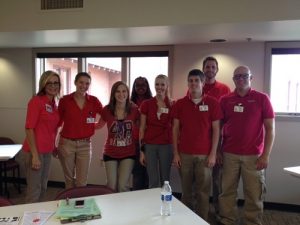24
September


For over six years, the Safe Communities’ Falls Prevention Task Force has provided leadership in the community to reduce fall risk for older adults. An annual community workshop, “Only Leaves Should Fall,” is offered in a central location and involves multiple health professions. The event begins with a physician calling attention to the value of falls screening and demonstrations by community resource people. Participants are partnered with a UW-Madison School of Pharmacy student and rotate among various fall screening stations to complete their fall risk questionnaire from the CDC’s STEADI materials. Seven student pharmacists, with faculty oversight provided by Professor Beth Martin, UW-Madison School of Pharmacy, conduct brief medication reviews with an emphasis on over-the-counter (OTC) agents, including promoting Vitamin D +/- calcium supplementation, and bone health assessments using the WHO-FRAX tool.
Prior to the falls workshop student pharmacists receive training on the tools and motivational interviewing strategies. Students affirm good things the older adults are already doing to reduce their fall risk and use open-ended questions to reveal areas they would like to modify, especially OTC sleep aids containing diphenhydramine. Other health professionals conducting falls risk screening services include nursing (vision and blood pressure checks), occupational therapy (home safety checks and brain health), and physical therapy (gait and balance, and large motor strength). Other ancillary stations include bladder health, footwear, tai chi, and home safety services. Falls workshop participants then learn from a Physical Therapy member how to interpret their risk assessments and what steps they can take next to improve their risk for falls. Participants are encouraged to create a personal action plan. In two recent events, over 50% of participants reported having a fall in the last year, more than 80% learned new information about risk factors associated with falling, and over 80% committed to at least one change in their life or lifestyle to reduce their fall risk. This year’s event was held Wednesday, September 23rd at the Fitchburg Senior Center, Fitchburg, Wis.




